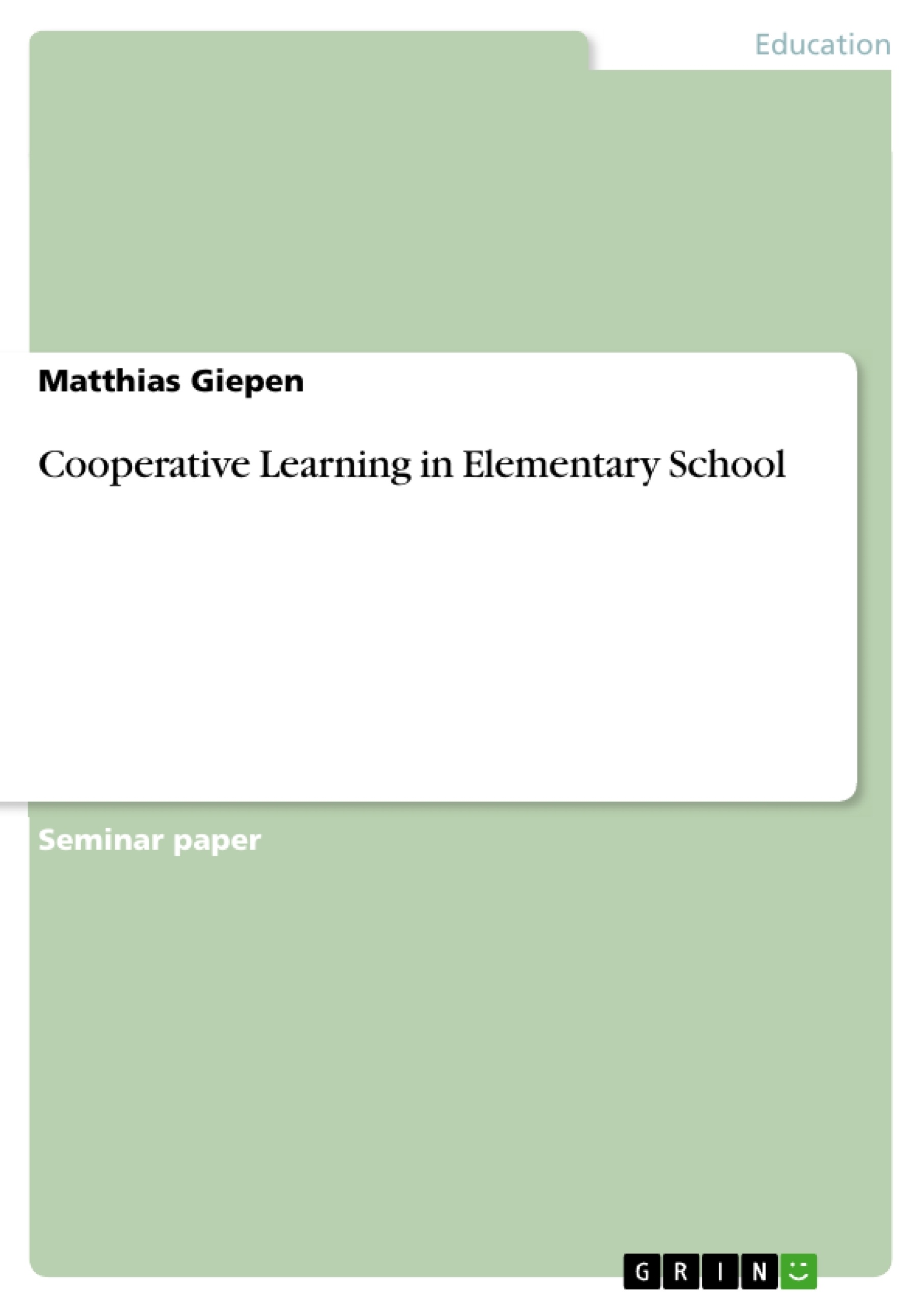Abstract
Nowadays, social skills become more and more important. Radical changes in numer-ous fields make the development of social skills more difficult. The development of social skills can be encouraged through forms of cooperative learning. The relevance of cooperative learning forms is elevated by the special advantages that their use within the EFL classroom offers. Cooperative learning greatly improves the classroom atmosphere and fosters the development of a child's personality especially during primary school. The limited fluency of primary school pupils seems to make it very difficult to implement some of the more complex cooperative learning methods. Teachers are often afraid of implementing cooperative learning forms in primary school (Putnam & Spenciner, 1993, p. 125). In this paper, reasons for the implementation of cooperative learning forms in primary school are given. In addition, cooperative learning methods are elaborated in terms of their usability in the EFL primary classroom.
Inhaltsverzeichnis (Table of Contents)
- Introduction
- Definition of Cooperative Learning according to Weidner
- Five Elements of Cooperative Learning
- Interpersonal and Small Group Skills - Social Skills
- Face-to-Face Interaction
- Individual and Group Accountability
- Positive Interdependence
- Group Processing
- The Relevance of Cooperative Learning in General
- Relevance of Cooperative Learning in the EFL Classroom
- The Principle of Emotional Safety
- The Supportive Context
- The Simultaneity Principle
- The Communicative Approach
- Relevance of Cooperative Learning in Primary School
- Cognitive Development during Primary School
- Cognitive Development according to Piaget
- The Requirements of the „Rahmenplan Grundschule”
- Relevance of Cooperative Learning in the EFL Classroom
- Cooperative Learning Forms in the EFL Primary Classroom
- The Inside-Outside Circle
- Advantages of the Inner-Outer Circle
- Basic Elements of Cooperative Learning in the Inner-Outer Circle
- The Same-Different Game
- Advantages of the Same-Different Game
- Basic Elements of Cooperative learning in the Same-Different Game
- The Inside-Outside Circle
- Conclusion
Zielsetzung und Themenschwerpunkte (Objectives and Key Themes)
This paper aims to demonstrate the feasibility, necessity, and benefits of incorporating cooperative learning strategies into EFL primary classes. It explores the definition and essential elements of cooperative learning, focusing on the importance of positive interdependence. By reviewing key principles of foreign language acquisition and Piaget's developmental theory, the paper establishes the relevance of cooperative learning for EFL primary education. Finally, two specific cooperative learning methods suitable for EFL primary classrooms are presented and analyzed.- The significance of cooperative learning for developing social skills in primary school students.
- The relevance of cooperative learning in the EFL classroom, emphasizing the principles of emotional safety, supportive context, simultaneity, and communicative approach.
- The application of cooperative learning methods in primary school, considering cognitive development and the "Rahmenplan Grundschule" guidelines.
- The analysis of specific cooperative learning methods like the Inside-Outside Circle and the Same-Different Game, highlighting their advantages and implementation.
- The importance of positive interdependence and group processes in fostering a successful learning environment.
Zusammenfassung der Kapitel (Chapter Summaries)
- The introduction establishes the need for cooperative learning in primary school due to students' social skill deficiencies. It introduces the paper's focus on the implementation and benefits of cooperative learning forms in EFL primary classrooms.
- Chapter 2 defines cooperative learning according to Weidner, highlighting the role of social processes and team development in this approach.
- Chapter 3 outlines the five key elements of cooperative learning: interpersonal and small group skills, face-to-face interaction, individual and group accountability, positive interdependence, and group processing.
- Chapter 4 examines the general relevance of cooperative learning, particularly its application in the EFL classroom and primary school. It discusses the principles of emotional safety, supportive context, simultaneity, and communicative approach in the EFL context. Additionally, the chapter explores cognitive development in primary school and the "Rahmenplan Grundschule" guidelines, emphasizing the need for cooperative learning.
- Chapter 5 introduces and analyzes two specific cooperative learning methods suitable for EFL primary classrooms: the Inside-Outside Circle and the Same-Different Game. It highlights the advantages and basic elements of each method.
Schlüsselwörter (Keywords)
This work primarily focuses on the application and benefits of cooperative learning in the EFL primary classroom. Key terms and concepts explored include social skills development, EFL instruction, positive interdependence, group dynamics, cognitive development, "Rahmenplan Grundschule," Inside-Outside Circle, and Same-Different Game.Frequently Asked Questions
What is Cooperative Learning?
Cooperative learning is an instructional strategy where small groups of students work together on a common task to maximize their own and each other's learning.
Why is cooperative learning relevant in the EFL primary classroom?
It provides emotional safety, increases student participation (simultaneity), and follows the communicative approach essential for language acquisition.
What are the five key elements of cooperative learning?
The elements are: Positive Interdependence, Individual Accountability, Face-to-Face Interaction, Social Skills, and Group Processing.
How does the "Inside-Outside Circle" method work?
Students form two concentric circles facing each other, allowing them to rotate and practice language patterns with multiple partners in a structured way.
Is cooperative learning suitable for young children with limited fluency?
Yes, when methods like the "Same-Different Game" are used, they foster both social skills and cognitive development regardless of the child's initial language level.
- Quote paper
- Matthias Giepen (Author), 2010, Cooperative Learning in Elementary School , Munich, GRIN Verlag, https://www.grin.com/document/182346



